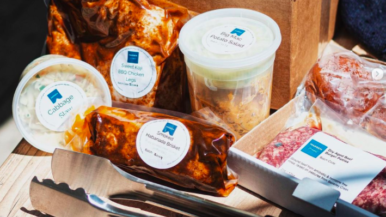“Now more than ever, we are seeing people engage with local food”: How Ontario farmers are faring during the pandemic
Small-scale farms, like every other business in the food industry, are pivoting to adjust to the new reality. Some are reporting a significant uptick in demand on the direct-to-consumer side, but with physical distancing mandates and strict isolation requirements for migrant workers, some farmers are struggling to keep up. Here’s how seven Ontario farmers are faring during the pandemic.
Murray’s Farm
Heritage animals abound at this Cambridge farm—pigs, turkeys and egg-laying hens. The farm also has a six-acre market garden and about 200 apple trees. You can find their wholesale eggs at retailers like Summerhill Market and Pusateris, or owner Murray Thunberg’s butcher shop in Hamilton.
“To be a food producer right now is to be on the right side of a terrible situation. It’s been so crazy at our store that I’m expanding and taking over the vacant space next to me. I normally wholesale my heritage pork to butcher shops and chefs, but the traffic at my own store is so significant right now that I’ve stopped trying to sell pork through those avenues. I keep increasing how many animals I send and we still sell out. The wholesale egg part of the farm is completely off the charts right now, too. I could literally sell three or four times the amount of eggs that we’re able to produce. I’ve gotten to the point that I don’t even pick up my phone anymore because it’s people looking for eggs. In the last week alone, I’ve been approached by four different groups of farmers wanting to add eggs to their CSA, but I just can’t help them. There’s also been a surge in private people wanting to purchase whole pigs. That makes sense given the situation we are in, but I’m just not able to accommodate those sales right now.” —Murray Thunberg, owner and farmer
Sosnicki Organics
More than 100 varieties of 30 organic veggie crops grow at this Norfolk County micro-farm. Sweetcorn, strawberries, heirloom tomatoes and cabbages are among their best-known products. Sosnicki produce is available via Mama Earth Organics, Dufferin Grove’s online market, and their upcoming online store.
“The closure of farmers’ markets put us in a tailspin, as one of our main sources of income is direct sales to consumers. So we put the word out on social media that we would deliver to homes directly, and there was a ton of interest—I couldn’t handle my inbox. We then ran head-first into creating a new website with a shop feature. That hasn’t even been enabled yet, but there’s so much demand already that I’m honestly scared to start it! The problem with direct home delivery is that we’re short on time this spring to get crops in, because the arrival of our migrant workers has been delayed. They are slowly arriving and isolating, but it’s a long process. We will only have five workers from Mexico this season—and Norfolk County farms are typically a mecca for migrant workers—so our local health board is not messing around. They allow only three workers per bunkhouse, require daily health checks during the 14-day isolation, and fines are levied at $750,000 if men are caught working during this period. Our main priority right now is getting the veggies planted and growing, even as our workers are isolating.” —Jessie Sosnicki, co-owner and farmer
Sheldon Creek Dairy
Sheldon Creek produces whole milk—including flavoured varieties, from chocolate to pumpkin spice and orange creamsicle—yogurt, kefir, 45% cream, labneh and butter, as well as beef from pasture-raised Shorthorn cows. The den Haan family, which runs the dairy, prides itself on knowing each cow by name.
“Small business is all about innovation, and there’s nothing like a pandemic to kick that into high gear. When Covid-19 hit, we lost about 40 per cent of our business sales due to the closure of coffee shops and restaurants, but about 32 per cent have since recovered thanks to online sales and an increase in demand from retailers. We’ve expanded our online store by adding new products from our own catalogue, and by building new relationships with other businesses and adding their products, including K2 Milling Flour, Backed By Bees and Breedons Maple Syrup. We closed the store to walk-in customers and are offering parking-lot pick up. Customers place an order online, drive to the farm, pop open the trunk and we put your order in for them. Many people who didn’t know we existed are finding us through our online store, which is wonderful! We’ve noticed a big upswing in the desire to purchase locally, as well as an increase in sales through the store. Whatever the new normal becomes after this, I truly hope people will continue to support local agriculture.” —Marianne Edward, operations manager
Cedar Grove Organic Farm
This small-scale Kawartha Lakes farm grows about 40 varieties of garlic alongside other vegetables like onions, tomatoes, squash, cabbage, and radishes. There’s a strong focus on community well-being and sustainable agriculture. They’re currently selling produce via CSA shares or online, with free delivery within Peterborough.
“We’ve completely changed how we get our products out. Normally, we would sell through farmers’ markets but now we’re shifting to contactless delivery through an online ordering system. The support for this service is continuously growing—it’s obvious that people are looking for ways to avoid going to grocery stores. To be completely honest, we can’t keep up with the demand. It’s April, and it’s been a cold April, so there’s nothing growing outside yet. We’ve mostly been delivering root vegetables stored from the end of last season as we wait for the new season to begin in the next few weeks. Despite all the harm caused by Covid, now more than ever, we are seeing people engage with local food. We feel so grateful for the support from the community and to have the opportunity to feed people who may not normally make food purchases close to home. For instance, we’ve seen an increased interest in our CSA program, which has led us to increase our maximum number of members, even though a month ago we were having trouble filling spots. But at the same time, there are only three of us working here, so our capacity to expand is limited by human power and the number of hours in the day. We’re trying! We’re also focusing more on social media and taking videos so that we can maintain our community connections while social-distancing. Even waving to those who support us when we drop off deliveries has felt so beautiful—many of our customers are people we normally see each week. It’s a big part of what motivates us to do what we do here.” —Alex Larkin, flower farmer
Trick’s Creek Farm
Grass-fed beef is the focus at this Huron County farm, though pasture-fed chickens and turkeys are also available. The herd consists mostly of Dexter cows, an Irish breed smaller than most commercial cattle. This year, Trick’s is introducing a Wagyu-cross variety raised, like all their cows, entirely grain-free. Products are available through their online store.
“I’ve been working towards selling beef directly to consumers for almost 10 years. With beef, there’s the conventional market or there’s the market that you create through meeting people and negotiating sales directly, and the conventional market was never profitable for me, a small-scale farmer raising a smaller breed of cattle. In the last two weeks, wholesalers that I’ve been calling and knocking on the doors of for years have called looking for supply. Here, we only sell what we grow, so without a doubt demand will outstrip supply. Typically, beef sales have grown very slowly, but in the last 6 weeks, it’s gone up to the point that we’re sold out of ground beef. To anyone in the beef business, this is pretty crazy. I’ve found a really loyal customer base and recently, they’ve been referring me to their friends. Most are buying as though they’re going to be cooking meals at home till the next delivery date. The biggest change is an awareness of physical distancing, increased hand washing and deliberately keeping chit chat minimized at drop offs. Customers are usually quite accommodating if delivery time is a bit off, but now, their tolerance and patience seems even higher. A few new customers have ordered out of the blue. I’m guessing that with more time to do research, a need to cook at home, and having to avoid the grocery store all contribute to more orders.” —Tom Trick, owner and farmer
Sunshine Asparagus Farms
This small-scale farm specializes—as the name suggests—in asparagus, though they also make a wide variety of pickles, including beets, carrots, garlic and beans. Their produce, sold through a variety of retailers around the Chatham-Kent area can also be purchased through their online shop.
“It’s a very challenging year for asparagus growers so far, because there have been lots of extra expenses to accommodate our migrant workers. Because of the six-foot rule for beds, we have had to acquire more living space for our workers. We’ve had to cancel more than 20 per cent of our workers because we couldn’t get them here and provide two weeks of isolation before harvest—so we’re hiring some local students instead. But we’ve had a lot of interest from local residents this year looking for work, so we’ll be hiring more people from the community going forward. This year, we’ll be delivering asparagus to our customers’ doors, but I expect our volume will be down 30 per cent or so—due to the new spacing rules, our packing line will only be able to run at half speed. We support the isolation of workers and the distancing needed to control the virus, but every step of the way adds more expenses. At the end of the day, either our prices must go up, or we will need to cut back production or eliminate labour-intensive crops, including asparagus. I know I sound quite pessimistic, but I hope that we can all pull through this and see a brighter tomorrow.” —John A. Jacques, proprietor and farmer
Foxfire Heritage Farm
Heritage breeds of chicken, cows, and pigs are raised at this Powassan farm, as well as a variety of vegetables. Their produce and meats are available for roadside pickup.
“We have a diverse farm with a wide range of products and services, and we’re actually doing very well during this situation. In terms of food production, we’ve seen a huge surge in people looking to support local business and avoid busy stores. We’re selling our products at our roadside stand, while still abiding by physical distancing guidelines. We’ve sold two months’ worth of pork product in only two weeks, and demand is still strong. We were looking to start supplying a few local restaurants with fresh produce throughout the summer, but they can no longer make any commitments this year due to business loss. Fortunately, this was going to be a new outlet for us to move our produce, rather than an already established part of our business, and we expect that we’ll be able to fill the gap with our roadside stand and CSA program. We’ve also been bombarded by folks looking to purchase pigs, day-old chicks and ready-to-lay hens, as people look to taking control of their own food security. This is really great for small farmers and hatcheries, as they’re the ones who will pick up the slack as larger facilities close due to Covid.” —Mattimus Larivee, co-owner






